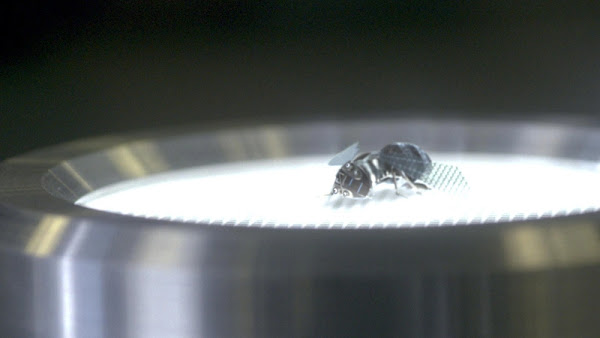Reflecting on the compelling Black Mirror episode "Hated in the Nation," it's clear that its exploration of social media's dark side and the uncharted territories of swarm intelligence continues to resonate even years after its initial release.
"Hated in the Nation," the longest episode of the anthology series, delivers a fusion of detective thriller and dystopian science fiction. The narrative follows Detective Karin Parke (Kelly Macdonald) and her tech-savvy partner Blue Coulson (Faye Marsay) as they investigate a series of deaths linked to social media and an experimental robotic bee project, Autonomous Drone Insects (ADIs), designed to counteract the declining bee population.
Series creator Charlie Brooker and director James Hawes masterfully build a world where online hate can have terrifying real-world consequences. Drawing inspiration from Scandi-noir detective dramas and bee extinction, Brooker ingeniously uses ADIs as instruments of public-directed death sentences, representing a harrowing examination of internet mob mentality and the perversion of technology.
With its successful blend of genres, engaging performances, and topical themes, "Hated in the Nation" stands as a prime example of Black Mirror's storytelling prowess. Its critique of social media and exploration of environmental challenges echo throughout the series, seen in the social ranking system in "Nosedive" or the automated hunter in "Metalhead".
Though Netflix doesn’t release viewing figures, the episode received positive reviews and generated much discourse upon its release, testifying to its popularity. Its blend of detective narrative and speculative fiction struck a chord with viewers and critics alike, earning it an 8.5 rating on IMDb.
"Hated in the Nation" shares thematic DNA with numerous other genre shows. Its central premise echoes the societal commentary of The Twilight Zone and the technophobic undercurrents of The X-Files. It also shares a kinship with more recent offerings like Westworld and The Expanse, which similarly explore the ethical implications of technology.
The episode's influence is evident in later science fiction narratives. HBO's Watchmen, for instance, explores similar themes of justice delivered through anonymity and the power of the mob. The CW's The 100 also delves into swarm intelligence, reflecting the technological anxieties presented in "Hated in the Nation".
"Hated in the Nation" also left a significant imprint on the genre's portrayal of female detectives. The depiction of Macdonald's Detective Parke laid the groundwork for other complex, determined female detectives navigating technology-infused mysteries in shows such as Netflix's The Stranger and Amazon Prime's Homecoming.
Today, "Hated in the Nation" remains a chilling exploration of technology and public sentiment. Its critique of social media's power to turn public opinion into a weapon of mass destruction is even more pertinent in our current digital age. It continues to inspire conversations around the ethical considerations of advanced technology and the dangers of online anonymity.
In the Black Mirror anthology, "Hated in the Nation" serves as a potent testament to the series' capacity to reflect society's relationship with technology. It shines a harsh light on the potential consequences of unregulated technological advancement and the dark underbelly of social media, forcing us to confront uncomfortable realities.
As we continue to negotiate the challenging landscape of technological innovation and its social implications, "Hated in the Nation" retains its power as a thought-provoking, chilling narrative. Its influence on the genre and its unflinching examination of technology's darker aspects solidify its place in science fiction history.




























No comments:
Post a Comment